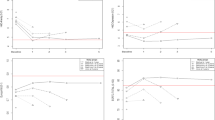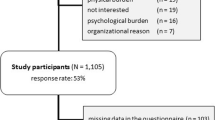Abstract
Background
People living with colorectal cancer are at risk of anxiety and depression. We investigated what factors were most highly associated with these.
Methods
Four hundred and ninety-six people with colorectal cancer completed the Hospital Anxiety and Depression Scale (HADS). Data on functioning, symptoms, illness perceptions and social difficulties were collected by questionnaire. Case-note-identified disease, treatment and co-morbidity data were recorded. Multiple logistic regression identified factors independently predictive of anxiety and depression caseness.
Results
Self-reported history of anxiety/depression predicted anxiety but not depression caseness. Depression caseness predicted anxiety caseness (p = 0.043), as did poorer self-reported cognitive functioning (p = 0.001), dyspnoea (p = 0.015) or diarrhoea (p = 0.021), reporting a high negative life and emotional impact (p < 0.001) and having difficulties with finance (p = 0.007). Having neo-adjuvant radiotherapy increased the odds of depression caseness (p = 0.007), as did poorer physical (p = 0.007), cognitive (p < 0.001) and social (p < 0.001) functioning, having constipation (p = 0.011), reporting a high negative life and emotional impact (p < 0.001), having difficulties with personal care (p = 0.022) and communicating with others (p = 0.014).
Conclusion
Levels of anxiety caseness were similar to those of non-clinical samples, but depression caseness was higher, particularly in those who had received neo-adjuvant radiotherapy. Most factors associated with possible or probable depression may be modified with appropriate intervention.
Similar content being viewed by others
References
Maddams J, Utley M, Møller H (2012) Projections of cancer prevalence in the United Kingdom, 2010–2040. Br J Cancer 107:1195–1202. doi:10.1038/bjc.2012.366
Gray NM, Hall SJ, Browne S, Macleod U, Mitchell E, Lee AJ, Johnston M, Wyke S, Samuel L, Weller D, Campbell NC (2011) Modifiable and fixed factors predicting quality of life in people with colorectal cancer. Br J Cancer 104:1697–1703. doi:10.1038/bjc.2011.155
Elliott J, Fallows A, Staetsky L, Smith PW, Foster CL, Maher EJ, Corner J (2011) The health and well-being of cancer survivors in the UK: findings from a population-based survey. Br J Cancer 105(Suppl 1):11–20. doi:10.1038/bjc.2011.418
Department of Health (2012) Quality of life of cancer survivors in England. Report on a pilot survey using Patient Reported Outcome Measures (PROMS). National Institute for Health Research, London
Scottish Intercollegiate Guideline Network (SIGN) (2011) Diagnosis and management of colorectal cancer. Guideline number 126. SIGN, Edinburgh
Phipps E, Braitman LE, Stites S, Leighton JC (2008) Quality of life and symptom attribution in long-term colon cancer survivors. J Eval Clin Pract 14:254–258. doi:10.1111/j.1365-2753.2007.00842.x
Denlinger CS, Barsevick AM (2009) The challenges of colorectal cancer survivorship. J Natl Compr Canc Netw 7:883–894
Arndt V, Merx H, Stegmaier C, Ziegler H, Brenner H (2006) Restrictions in quality of life in colorectal cancer patients over three years after diagnosis: a population based study. Eur J Cancer 42:1848–1857. doi:10.1016/j.ejca.2006.01.059
Harrington CB, Hansen JA, Moskowitz M, Todd BL, Feuerstein M (2010) It’s not over when it’s over: long-term symptoms in cancer survivors—a systematic review. Int J Psychiatry Med 40:163–181
Tsunoda A, Nakao K, Hiratsuka K, Yasuda N, Shibusawa M, Kusano M (2005) Anxiety, depression and quality of life in colorectal cancer patients. Int J Clin Oncol 10:411–417
Strong V, Waters R, Hibberd C, Rush R, Cargill A, Storey D, Walker J, Wall L, Fallon M, Sharpe M (2007) Emotional distress in cancer patients: the Edinburgh Cancer Centre symptom study. Br J Cancer 96:868–874. doi:10.1038/sj.bjc.6603626
Alacacioglu A, Binicier O, Gungor O, Oztop I, Dirioz M, Yilmaz U (2010) Quality of life, anxiety, and depression in Turkish colorectal cancer patients. Support Care Cancer 18:417–421. doi:10.1007/s00520-009-0679-2
Medeiros M, Oshima CT, Forones NM (2010) Depression and anxiety in colorectal cancer patients. J Gastrointest Cancer 41:179–184. doi:10.1007/s12029-010-9132-5
Ramsey SD, Berry K, Moinpour C, Giedzinska A, Andersen MR (2002) Quality of life in long term survivors of colorectal cancer. Am J Gastroenterol 97:1228–1234
Satin JR, Linden W, Phillips MJ (2009) Depression as a predictor of disease progression and mortality in cancer patients. Cancer 115:5349–5361. doi:10.1002/cncr.24561
Spiegel D, Giese-Davis J (2003) Depression and cancer: mechanisms and disease progression. Biol Psychiatry 54:269–282
Die Trill M (2012) Psychological aspects of depression in cancer patients. Ann Oncol 23(Supplement 10):x302–x305. doi:10.1093/annonc/mds350
Salvo N et al (2012) Frequency of reporting and predictive factors for anxiety and depression in patients with advanced cancer. Clin Oncol 24:139e–148e
Vodermaier A, Linden W, MacKenzie R, Greig D, Marshall C (2011) Disease stage predicts post-diagnosis anxiety and depression only in some types of cancer. Br J Cancer 105:1814–1817
Rhondali W, Perceau E, Berthiller J, Saltel P, Trillet-Lenoir V, Tredan O, Coulon JP, Bruera E, Filbet M (2012) Frequency of depression among oncology outpatients and association with other symptoms. Support Care Cancer 20:2795–2802. doi:10.1007/s00520-012-1401-3
Simon AE, Thompson MR, Flashman K, Wardle J (2009) Disease stage and psychosocial outcomes in colorectal cancer. Colorectal Dis 11:19–25. doi:10.1111/j.1463-1318.2008.01501.x
Pereira MG, Figueiredo AP, Fincham FD (2012) Anxiety, depression, traumatic stress and quality of life in colorectal cancer after different treatments: a study with Portuguese patients and their partners. Eur J Oncol Nurs 16:227e–232e
Bang S, Park SH, Kang HG, Jue JI, Cho IH, Yun YH, Cho EK, Shin DB, Lee JH (2005) Changes in quality of life during palliative chemotherapy for solid cancer. Support Care Cancer 13:515–521
Hodges K, Winstanley S (2012) Effects of optimism, social support, fighting spirit, cancer worry and internal health locus of control on positive affect in cancer survivors: a path analysis. Stress Heal 28:408–415. doi:10.1002/smi.2471
Husson O, Thong MS, Mols F, Oerlemans S, Kaptein AA, van de Poll-Franse LV (2013) Illness perceptions in cancer survivors: what is the role of information provision? Psycho-Oncology 22(3):490–498
Zigmond AS, Snaith RP (1983) The Hospital Anxiety and Depression Scale. Acta Psychiatr Scand 67:361–370. doi:10.1111/j.1600-0447.1983.tb09716.x
Bjelland I, Dahl AA, Haug TT, Neckelmann D (2002) The validity of the hospital anxiety and depression scale: an updated literature review. J Psychosom Res 52:69–77. doi:10.1016/S0022-3999(01)00296-3
Groenvold M, Klee MC, Sprangers MAG, Aaronson NK (1997) Validation of the EORTC QLQ-C30 quality of life questionnaire through combined qualitative and quantitative assessment of patient-observer agreement. J Clin Epidemiol 50:441–450
Moss-Morris R, Weinman J, Petrie K, Horne R, Cameron L, Buick D (2002) The Revised Illness Perception Questionnaire (IPQ-R). Psychol Health 17:1–16. doi:10.1080/08870440290001494
Wright P, Smith A, Roberts K, Selby P, Velikova G (2007) Screening for social difficulties in cancer patients: clinical utility of the social difficulties inventory. Br J Cancer 97:1063–1070
Wright EP, Kiely M, Johnston C, Smith AB, Cull A, Selby PJ (2005) Development and evaluation of an instrument to assess social difficulties in routine oncology practice. Qual Life Res 14:373–386. doi:10.1007/s11136-004-5332-4
Crawford JR, Henry JD, Crombie C, Taylor EP (2001) Normative data for the HADS from a large non-clinical sample. Br J Clin Psychol 40:429–434
Speck RM, Courneya KS, Masse LC, Duval S, Schmitz KH (2010) An update of controlled physical activity trials in cancer survivors: a systematic review and meta-analysis. J Cancer Surviv 4:87–100. doi:10.1007/s11764-009-0110-5
Dieterich M, Irving CB, Park B, Marshall M (2010) Intensive case management for severe mental illness. Cochrane Database Syst Rev 10, CD007906. doi:10.1002/14651858.CD007906.pub2
Strong V, Waters R, Hibberd C, Murray G, Wall L, Walker J, McHugh G, Walker A, Sharpe M (2008) Management of depression for people with cancer (SMaRT oncology 1): a randomised trial. Lancet 372:40–48. doi:10.1016/S0140-6736(08)60991-5
Acknowledgments
The research team would like to thank all of the clinicians who granted access to their clinics. We are deeply grateful to those patients who gave their time to help with this research at what may have been a very difficult and distressing time. Thanks to our Steering Group members Professor Mandy Ryan (University of Aberdeen), Sue Ziebland (University of Oxford), Professor David Weller (University of Edinburgh) and Professor Sally Wyke (University of Glasgow) for their support and help with this project. The study was funded by a project grant from Cancer Research UK. The University of Aberdeen is the study sponsor.
Conflict of interest
There is no conflict of interests to declare. We (the authors) have had full control of all the primary data and are happy for the journal to review this data as required.
Author information
Authors and Affiliations
Corresponding author
Electronic supplementary material
Below is the link to the electronic supplementary material.
ESM 1
(DOCX 46 kb)
Rights and permissions
About this article
Cite this article
Gray, N.M., Hall, S.J., Browne, S. et al. Predictors of anxiety and depression in people with colorectal cancer. Support Care Cancer 22, 307–314 (2014). https://doi.org/10.1007/s00520-013-1963-8
Received:
Accepted:
Published:
Issue Date:
DOI: https://doi.org/10.1007/s00520-013-1963-8




